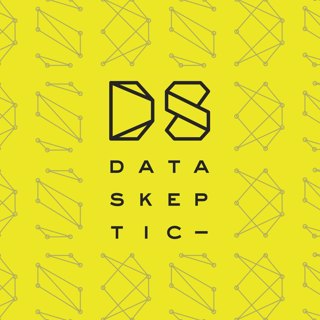
The Library Problem
We close out 2016 with a discussion of a basic interview question which might get asked when applying for a data science job. Specifically, how a library might build a model to predict if a book will be returned late or not.
30 Joulu 201635min

2016 Holiday Special
Today's episode is a reading of Isaac Asimov's Franchise. As mentioned on the show, this is just a work of fiction to be enjoyed and not in any way some obfuscated political statement. Enjoy, and happy holidays!
23 Joulu 201639min
![[MINI] Entropy](https://cdn.podme.com/podcast-images/B1A01069E3E48736390A3EA4BB213338_small.jpg)
[MINI] Entropy
Classically, entropy is a measure of disorder in a system. From a statistical perspective, it is more useful to say it's a measure of the unpredictability of the system. In this episode we discuss how information reduces the entropy in deciding whether or not Yoshi the parrot will like a new chew toy. A few other everyday examples help us examine why entropy is a nice metric for constructing a decision tree.
16 Joulu 201616min

MS Connect Conference
Cloud services are now ubiquitous in data science and more broadly in technology as well. This week, I speak to Mark Souza, Tobias Ternström, and Corey Sanders about various aspects of data at scale. We discuss the embedding of R into SQLServer, SQLServer on linux, open source, and a few other cloud topics.
9 Joulu 201642min

Causal Impact
Today's episode is all about Causal Impact, a technique for estimating the impact of a particular event on a time series. We talk to William Martin about his research into the impact releases have on app and we also chat with Karen Blakemore about a project she helped us build to explore the impact of a Saturday Night Live appearance on a musician's career. Martin's work culminated in a paper Causal Impact for App Store Analysis. A shorter summary version can be found here. His company helping app developers do this sort of analysis can be found at crestweb.cs.ucl.ac.uk/appredict/.
2 Joulu 201634min
![[MINI] The Bootstrap](https://cdn.podme.com/podcast-images/7C57C80B6107185A1853EA37AA1F81FC_small.jpg)
[MINI] The Bootstrap
The Bootstrap is a method of resampling a dataset to possibly refine it's accuracy and produce useful metrics on the result. The bootstrap is a useful statistical technique and is leveraged in Bagging (bootstrap aggregation) algorithms such as Random Forest. We discuss this technique related to polling and surveys.
25 Marras 201610min
![[MINI] Gini Coefficients](https://cdn.podme.com/podcast-images/0CB79915CADD4FF315AEC0244BFE0624_small.jpg)
[MINI] Gini Coefficients
The Gini Coefficient (as it relates to decision trees) is one approach to determining the optimal decision to introduce which splits your dataset as part of a decision tree. To pick the right feature to split on, it considers the frequency of the values of that feature and how well the values correlate with specific outcomes that you are trying to predict.
18 Marras 201615min

Unstructured Data for Finance
Financial analysis techniques for studying numeric, well structured data are very mature. While using unstructured data in finance is not necessarily a new idea, the area is still very greenfield. On this episode,Delia Rusu shares her thoughts on the potential of unstructured data and discusses her work analyzing Wikipedia to help inform financial decisions. Delia's talk at PyData Berlin can be watched on Youtube (Estimating stock price correlations using Wikipedia). The slides can be found here and all related code is available on github.
11 Marras 201633min




















